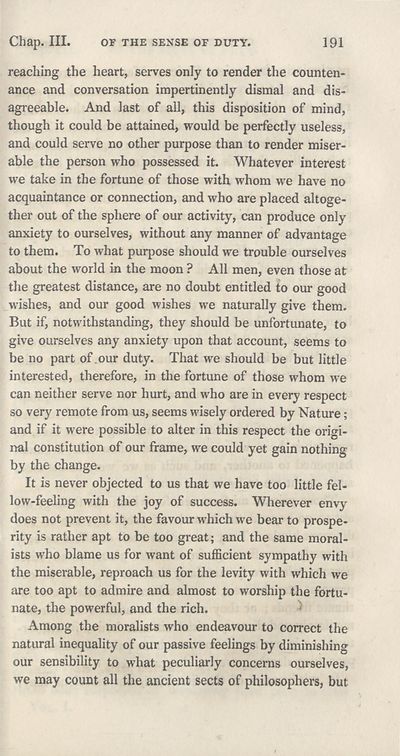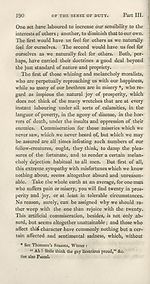Religion & morality > Theory of moral sentiments, or, An essay towards an analysis of the principles by which men naturally judge concerning the conduct and character, first of their neighbours, and afterwards of themselves > Volume 1
(227)
Download files
Complete book:
Individual page:
Thumbnail gallery: Grid view | List view

Chap. III. OF THE SENSE OF DUTY.
191
reaching the heart, serves only to render the counten¬
ance and conversation impertinently dismal and dis¬
agreeable. And last of all, this disposition of mind,
though it could be attained, would be perfectly useless,
and could serve no other purpose than to render miser¬
able the person who possessed it. Whatever interest
we take in the fortune of those with whom we have no
acquaintance or connection, and who are placed altoge¬
ther out of the sphere of our activity, can produce only
anxiety to ourselves, without any manner of advantage
to them. To what purpose should we trouble ourselves
about the world in the moon ? All men, even those at
the greatest distance, are no doubt entitled to our good
wishes, and our good wishes we naturally give them.
But if, notwithstanding, they should be unfortunate, to
give ourselves any anxiety upon that account, seems to
be no part of our duty. That we should be but little
interested, therefore, in the fortune of those whom we
can neither serve nor hurt, and who are in every respect
so very remote from us, seems wisely ordered by Nature;
and if it were possible to alter in this respect the origi¬
nal constitution of our frame, we could yet gain nothing
by the change.
It is never objected to us that we have too little fel¬
low-feeling with the joy of success. Wherever envy
does not prevent it, the favour which we bear to prospe¬
rity is rather apt to be too great; and the same moral¬
ists who blame us for want of sufficient sympathy with
the miserable, reproach us for the levity with which we
are too apt to admire and almost to worship the fortu¬
nate, the powerful, and the rich.
Among the moralists who endeavour to correct the
natural inequality of our passive feelings by diminishing
our sensibility to what peculiarly concerns ourselves,
we may count all the ancient sects of philosophers, but
191
reaching the heart, serves only to render the counten¬
ance and conversation impertinently dismal and dis¬
agreeable. And last of all, this disposition of mind,
though it could be attained, would be perfectly useless,
and could serve no other purpose than to render miser¬
able the person who possessed it. Whatever interest
we take in the fortune of those with whom we have no
acquaintance or connection, and who are placed altoge¬
ther out of the sphere of our activity, can produce only
anxiety to ourselves, without any manner of advantage
to them. To what purpose should we trouble ourselves
about the world in the moon ? All men, even those at
the greatest distance, are no doubt entitled to our good
wishes, and our good wishes we naturally give them.
But if, notwithstanding, they should be unfortunate, to
give ourselves any anxiety upon that account, seems to
be no part of our duty. That we should be but little
interested, therefore, in the fortune of those whom we
can neither serve nor hurt, and who are in every respect
so very remote from us, seems wisely ordered by Nature;
and if it were possible to alter in this respect the origi¬
nal constitution of our frame, we could yet gain nothing
by the change.
It is never objected to us that we have too little fel¬
low-feeling with the joy of success. Wherever envy
does not prevent it, the favour which we bear to prospe¬
rity is rather apt to be too great; and the same moral¬
ists who blame us for want of sufficient sympathy with
the miserable, reproach us for the levity with which we
are too apt to admire and almost to worship the fortu¬
nate, the powerful, and the rich.
Among the moralists who endeavour to correct the
natural inequality of our passive feelings by diminishing
our sensibility to what peculiarly concerns ourselves,
we may count all the ancient sects of philosophers, but
Set display mode to:
![]() Universal Viewer |
Universal Viewer | ![]() Mirador |
Large image | Transcription
Mirador |
Large image | Transcription
| Permanent URL | https://digital.nls.uk/125601345 |
|---|
| Attribution and copyright: |
|
|---|
| Description | Thousands of printed books from the Antiquarian Books of Scotland collection which dates from 1641 to the 1980s. The collection consists of 14,800 books which were published in Scotland or have a Scottish connection, e.g. through the author, printer or owner. Subjects covered include sport, education, diseases, adventure, occupations, Jacobites, politics and religion. Among the 29 languages represented are English, Gaelic, Italian, French, Russian and Swedish. |
|---|

